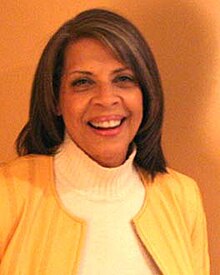Patti Austin
| Patti Austin | |
|---|---|

Austin at the Ram's Head in Annapolis, Maryland, 2007
|
|
| Background information | |
| Born |
August 10, 1950 Harlem, New York |
| Genres | R&B, jazz, dance, adult contemporary |
| Occupation(s) | Musician |
| Instruments | Singer |
| Years active | 1955–Present |
| Labels | Coral, Columbia, A&M, ABC, United Artists, CTI, Qwest, GRP, Concord, Warner Bros. |
| Website | www |
Patti Austin (born 10 August 1950) is an American R&B, pop and jazz singer.
Austin was born in Harlem, New York to Gordon Austin, a jazz trombonist, and Edna Austin and was raised in Bay Shore, New York on Long Island.Quincy Jones and Dinah Washington have referred to themselves as her godparents.
When she was four years old, she made her debut at the Apollo Theater and the next year had a contract with RCA Records. During the 1960s, she was a session musician who sang background vocals and commercial jingles. She was known as "Queen of the Jingles," appearing on commercials for Almay, Avon, Burger King, Impulse, KFC, Maxwell House, McDonald's, Meow Mix, Stouffer's, and the United States Army.
In 1969, she made the R&B Top 50 with the single "Family Tree". Her debut album, End of a Rainbow, appeared in 1976 on the jazz label CTI Records. Two years later, she sang on the song "Love Light" by Japanese musician Yutaka Yokokura. She and Michael Jackson performed a duet on "It's the Falling in Love", which appeared on his album Off the Wall, and in 1980 she and jazz guitarist George Benson performed a duet on "Moody's Mood for Love". She provided vocals for Roberta Flack, Angela Bofill, and Noel Pointer.
In 1981, she sang on the album The Dude by Quincy Jones and on the hit single "Razzmatazz". Jones signed her to his record label, Qwest Records. Her album Every Home Should Have One (Qwest, 1981) contained "Baby, Come to Me", a duet with James Ingram which reached No. 1 on the pop music chart at Billboard magazine, boosted by its appearance on the television soap opera General Hospital. A second duet with Ingram, "How Do You Keep the Music Playing", was used on the soundtrack for the movie Best Friends (1982).
...
Wikipedia
